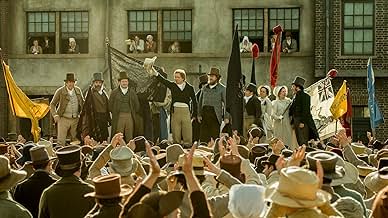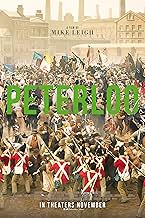AVALIAÇÃO DA IMDb
6,5/10
5,8 mil
SUA AVALIAÇÃO
A história do massacre de Peterloo em 1819, onde as forças britânicas atacaram uma manifestação pacífica pela democracia em Manchester.A história do massacre de Peterloo em 1819, onde as forças britânicas atacaram uma manifestação pacífica pela democracia em Manchester.A história do massacre de Peterloo em 1819, onde as forças britânicas atacaram uma manifestação pacífica pela democracia em Manchester.
- Direção
- Roteirista
- Artistas
- Prêmios
- 4 vitórias e 8 indicações no total
Avaliações em destaque
This is the first review I've ever done, but was moved to do so by some reviews that I have read on here since watching the film. So apologies to you experts, but here's my tuppenceworth. On the down side, a bit overlong, could have been a bit less wordy and faster paced. But, I left the cinema with the same feeling that I did in the early 70s after seeing Soldier Blue: stunned by the brutality of "the authorities" over the disenfranchised. Forensic in its drama/documentry approach and absolutely true to events (I have since checked various historical sources). This is what happens when people feel they lack a voice and does resonate with today's UK. I thought the lighting was superb and the epic, grand scale setting rare in a UK film. A must watch for teenagers who will not have heard of this event in history at school.
A slow work up to the massacre. Incredible massacre scene. Would have like more on the aftermath as the film ended abruptly. Overlong I thought.
Quite a long film, but it didn't drag. Tells the story well, but there are really no lead characters, and many of the characters are rather two-dimensional or even caricatures. Visually, it is excellent. I didn't know much about the Peterloo massacre before seeing the film. I now feel educated, and felt that it was two and a half hours well spent, although not a film without flaws. Stronger (more realistically human) characters could perhaps have made the film more engaging, but maybe telling the (hi)story was more important here.
As with most movies today, the extremes are over-represented and the underlying issues barely addressed. England was reeling from a Napoleanic, banker-funded war, ending in oppressive debt for the major powers of Europe. The Bank of England and the Bank of France were both formed to lend money to their respective governments, with few constraints on the pyramiding, in order to fund regular wars. The French revolution was trying to spread its socialist conclusions. Men are represented as either cruel, money-grubbing wealthy industrialists or poor, woe-is-me peasant labor, although one could hardly call people who had several sets of clothes, a house and sets of dishes as poor. The gratuitous men-oppress-their-more-intelligent-women folk is consistent with modern social justice bleatings. Consequently, what we see is the plight of what the French called the bourgeoisie, or the merchant and skilled labor class. The entrenched oligarchies were hanging on to their power, generated by industrial technological expansions (in this case the mechanical loom), which ironically needed skilled laborers and supporting merchants, who also were gaining wealth, counter to the woe-is-me picture. Much of the problem was the government-imposed lack of producers' and laborers' ability to negotiate the price of their labor and the markets for their products. The many government-oligopoly controls on cloth production are not presented, but were responsible for most of the tension. Of course, these issues would hardly sell to uninformed viewers.
As with the onset of the French revolution, the key issue is never quite resolved in these movies, or in the social justice bleatings of today: after the dust settles, who will be in charge and what will the new rules be? Will the current oppressors be replaced by worse oppressors? Meet the new boss, same as the old boss, both in labor and management. Government meddling has and will cause tragedy.
As with the onset of the French revolution, the key issue is never quite resolved in these movies, or in the social justice bleatings of today: after the dust settles, who will be in charge and what will the new rules be? Will the current oppressors be replaced by worse oppressors? Meet the new boss, same as the old boss, both in labor and management. Government meddling has and will cause tragedy.
If I have a criticism of this film, it would be that it's half an hour too long. Mike can be a bit self indulgent, there where a few scenes that were just there for colour. Technically accomplished, well acted, and faithfully accurate to the history. If you like social history you will not be disappointed.
Você sabia?
- CuriosidadesThe film was released 200 years after the Peterloo Massacre.
- Erros de gravaçãoThe young Waterloo veteran who continues to wear his redcoat during the film can be seen in one shot with Corporal stripes whereas the rest of the film his tunic is that of a Private.
- Citações
Prince Regent: I know what is good for my people better than they know themselves!
- ConexõesFeatured in Granada Reports: 16 August 2018: Evening Bulletin (2018)
Principais escolhas
Faça login para avaliar e ver a lista de recomendações personalizadas
Detalhes
- Data de lançamento
- País de origem
- Centrais de atendimento oficiais
- Idioma
- Também conhecido como
- La tragèdia de Peterloo
- Locações de filme
- Hebden Bridge, West Yorkshire, Inglaterra, Reino Unido(Workers being drilled before marching)
- Empresas de produção
- Consulte mais créditos da empresa na IMDbPro
Bilheteria
- Faturamento bruto nos EUA e Canadá
- US$ 151.971
- Fim de semana de estreia nos EUA e Canadá
- US$ 26.002
- 7 de abr. de 2019
- Faturamento bruto mundial
- US$ 2.159.214
- Tempo de duração
- 2 h 34 min(154 min)
- Cor
- Mixagem de som
- Proporção
- 1.85 : 1
Contribua para esta página
Sugerir uma alteração ou adicionar conteúdo ausente








































